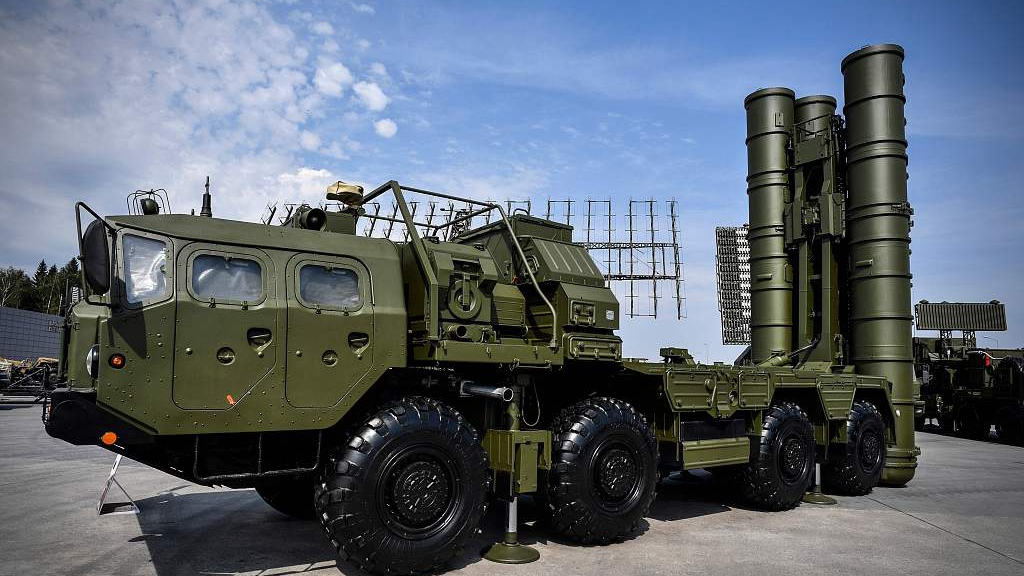Editor's note: David Lee is a consultant and author based in Beijing who works on cross-cutting themes of energy, health, international politics and international development. The article reflects the author's opinion, and not necessarily the views of CGTN.
Earlier this month, the atmosphere at the low-key foreign ministerial meeting in Washington DC to celebrate
the 70th anniversary of NATO was awkward and uncomfortable, as Vice President Mike Pence of the United States openly scolded stubborn Turkey for
purchasing the S-400 air defense system from Russia.
Even as the United States squabbled with European allies about defense spending, a much more serious split between Turkey and the rest of the grouping was unfolding, making the 70-year-old alliance look all the more feeble and shaky, quite befitting the characteristics of its senile age.
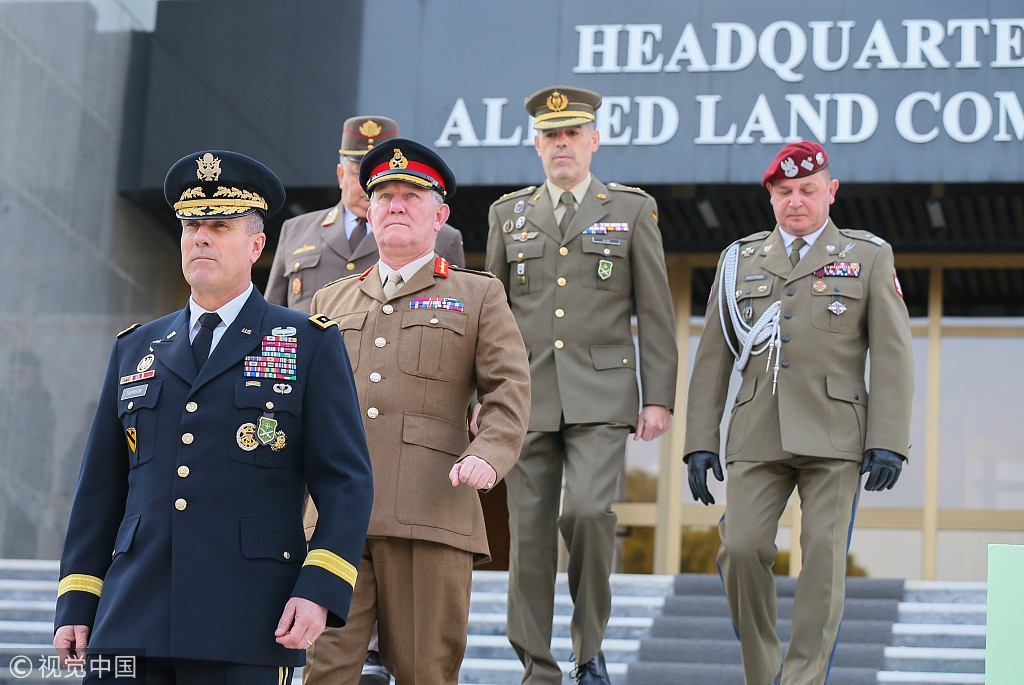
Commander of NATO Allied Land Command (LANDCOM) Lieutenant General John C. Thomson (L) and Lieutenant General Richard Cripwell (2nd L) attend a ceremony marking the 70th anniversary of NATO at the NATO Allied Land Command Headquarters in Izmir, Turkey on April 4, 2019. /VCG Photo.
Commander of NATO Allied Land Command (LANDCOM) Lieutenant General John C. Thomson (L) and Lieutenant General Richard Cripwell (2nd L) attend a ceremony marking the 70th anniversary of NATO at the NATO Allied Land Command Headquarters in Izmir, Turkey on April 4, 2019. /VCG Photo.
Defiant, Turkey's Recep Tayyip Erdogan would rebuke Pence by reiterating a couple of days later that Turkey would continue to make payments under its deal with Russia to buy the S-400 missile defense system. "The S-400 holds an important place in our talks," said the Turkish President last Friday. "The United States' arguments are very wrong. We finished the S-400 process, and our payments continue."
Defense pundits have argued that the S-400 missile defense system is, in essence, a computer system that gathers information, thus putting at significant risk the Joint Strike Fighter (JSF) program. The JSF program, led by the United States, is aimed to develop and deploy F-35 fighters in allied powers. Turkey is a party to the program that both receive the fighters and produces certain parts.
Parallel to Pence's high-key warning against Turkey, the U.S. Defense Department suspended the delivery of fighter parts and program materials to Turkey, saying deliveries would not resume unless Ankara abandoned its planned acquisition of the Russian missile defense system.
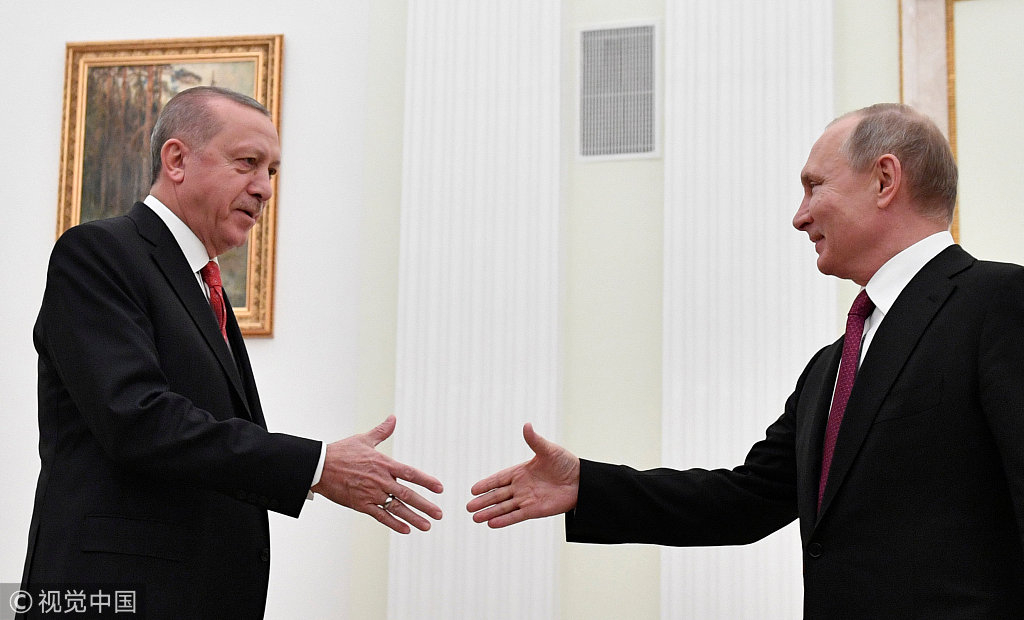
Russian President Vladimir Putin (R) shakes hands with his Turkish counterpart Tayyip Erdogan during a meeting at the Kremlin in Moscow, Russia, January 23, 2019. /VCG Photo.
Russian President Vladimir Putin (R) shakes hands with his Turkish counterpart Tayyip Erdogan during a meeting at the Kremlin in Moscow, Russia, January 23, 2019. /VCG Photo.
The S-400 standoff apparently is becoming a deadlock. While Turkey plays against the United States in a chicken game to see who blinks first, it is increasingly isolated in NATO where no other member has come forward to back the Turkish position.
It's useful to put things in historical perspective when trying to understand the current Turkey-NATO deadlock. In the early 1950s when Turkey joined the NATO, it was, in the eyes of the West, a model pupil from the Muslim countries that resisted “communist infiltration” under the dark shadows of the Iron Curtain.
However, with the end of the Cold War and in the absence of an evil enemy like the Soviet Union, unfolding new dynamics have pushed Turkey further away from its NATO allies while the security grouping continues to readjust itself. Particularly, over the years since Erdogan assumed leadership of Turkey as either Prime Minister or President, Turkey-NATO relations have seen more hate than love.
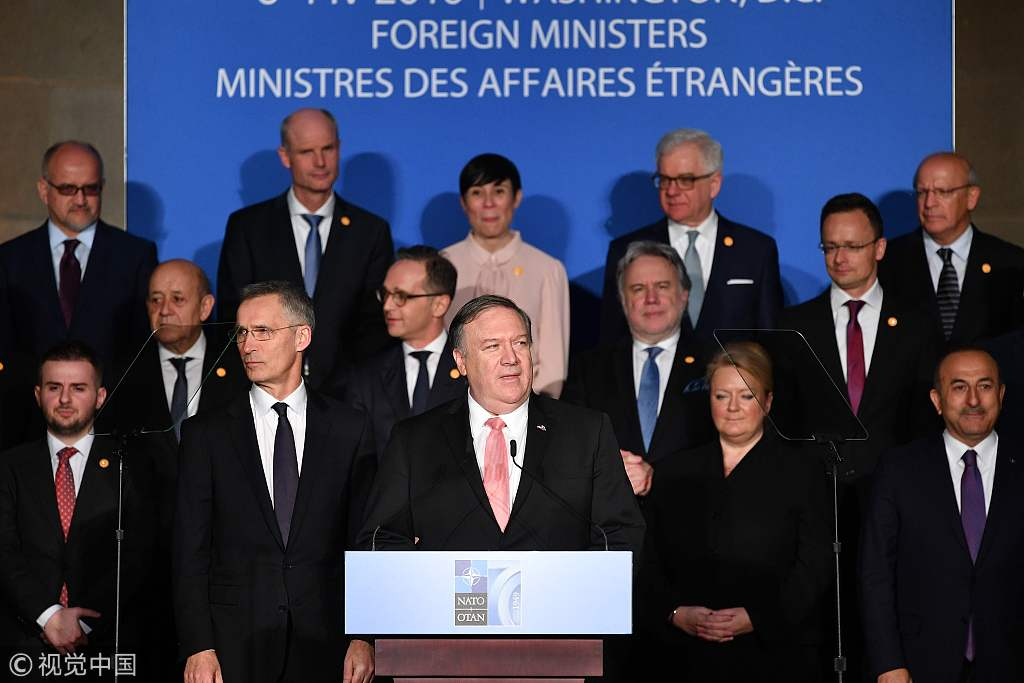
US Secretary of State Mike Pompeo (C) speaks during a reception celebrating NATO's 70th anniversary at the Andrew W. Mellon Auditorium in Washington, DC on April 3, 2019. /VCG Photo.
US Secretary of State Mike Pompeo (C) speaks during a reception celebrating NATO's 70th anniversary at the Andrew W. Mellon Auditorium in Washington, DC on April 3, 2019. /VCG Photo.
In April 2009, Turkey held a joint military exercise with Syria, labeled as a Russian-armed and trained client state. In 2011, Turkey was most reluctant to support NATO's anti-Qaddafi campaign in Libya. In 2012, Turkey became a dialogue partner with the
Shanghai Cooperation Organization.
In 2013, Turkey announced the selection of a Chinese company for the construction of its first long-range air and anti-missile defense system. Amid NATO outcry, the Chinese contract was scrapped. Throughout the deadly Syrian crisis, Turkey has shown that it intends to install a Sunni, pro-Turkey, Islamist regime in his place, poles apart from the United States and other NATO allies.
NATO strategists have long openly questioned the trustworthiness of Turkey under Erdogan, who has been labeled a xenophobic nationalist, Islamist and autocrat. Erdogan on his part has not been shy to criticize either NATO or the United States.
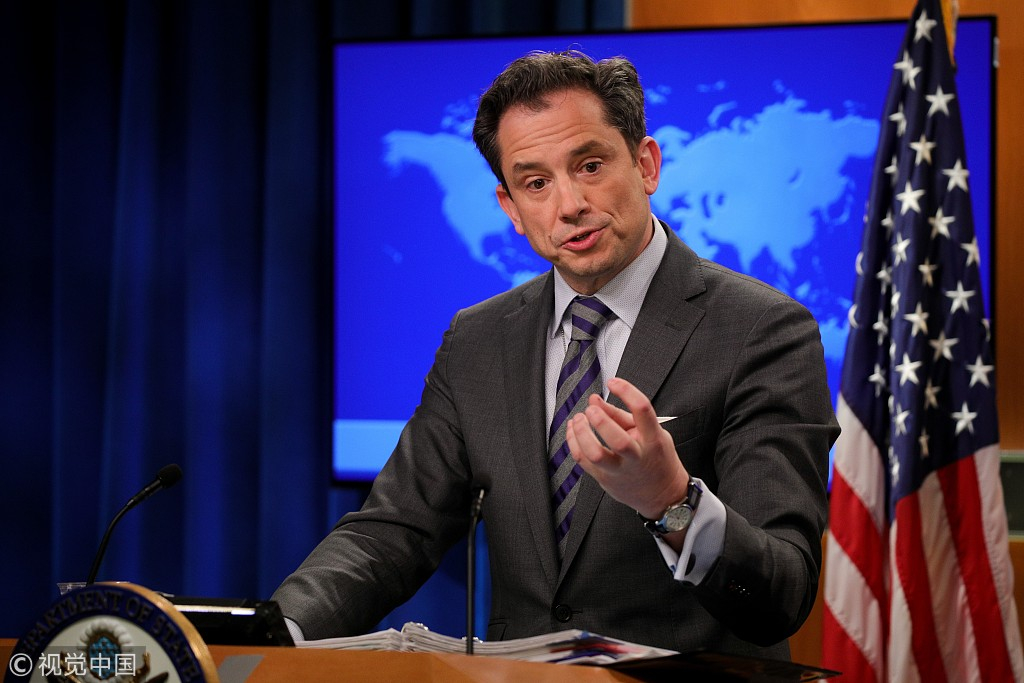
Deputy spokesperson of U.S. Department of State, Robert Palladino speaks during a press briefing on Turkey's attempt to purchase S-400 missile systems from Russia at the State Department in Washington, DC on March 5, 2019. /VCG Photo.
Deputy spokesperson of U.S. Department of State, Robert Palladino speaks during a press briefing on Turkey's attempt to purchase S-400 missile systems from Russia at the State Department in Washington, DC on March 5, 2019. /VCG Photo.
That said, will the S-400 deal be the last straw to crush Turkey's troubled marriage with NATO? While prudent analysts always resist the temptation to make any prediction, it's clear now that the very foundation of Turkey-NATO relations is disappearing.
The official Turkish position ostensibly remains to recognize NATO's central role in security. However, it's hard to see any agenda alignment between NATO and Turkey on any key strategic front – Syria, Iran, Russia and even China. Turkey and NATO may have to brace for the time of reckoning sooner or later, when incremental steps of animosity finally culminate in a showdown, perhaps manifested in the form of Turkey's forced binary choice between the S-400 and F-35s.
(If you want to contribute and have specific expertise, please contact us at opinions@cgtn.com.)

